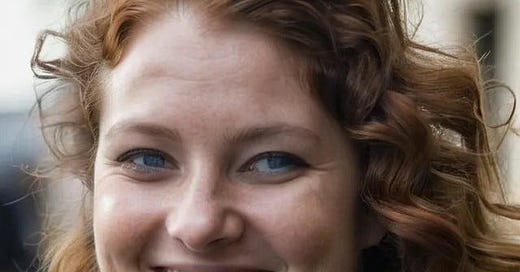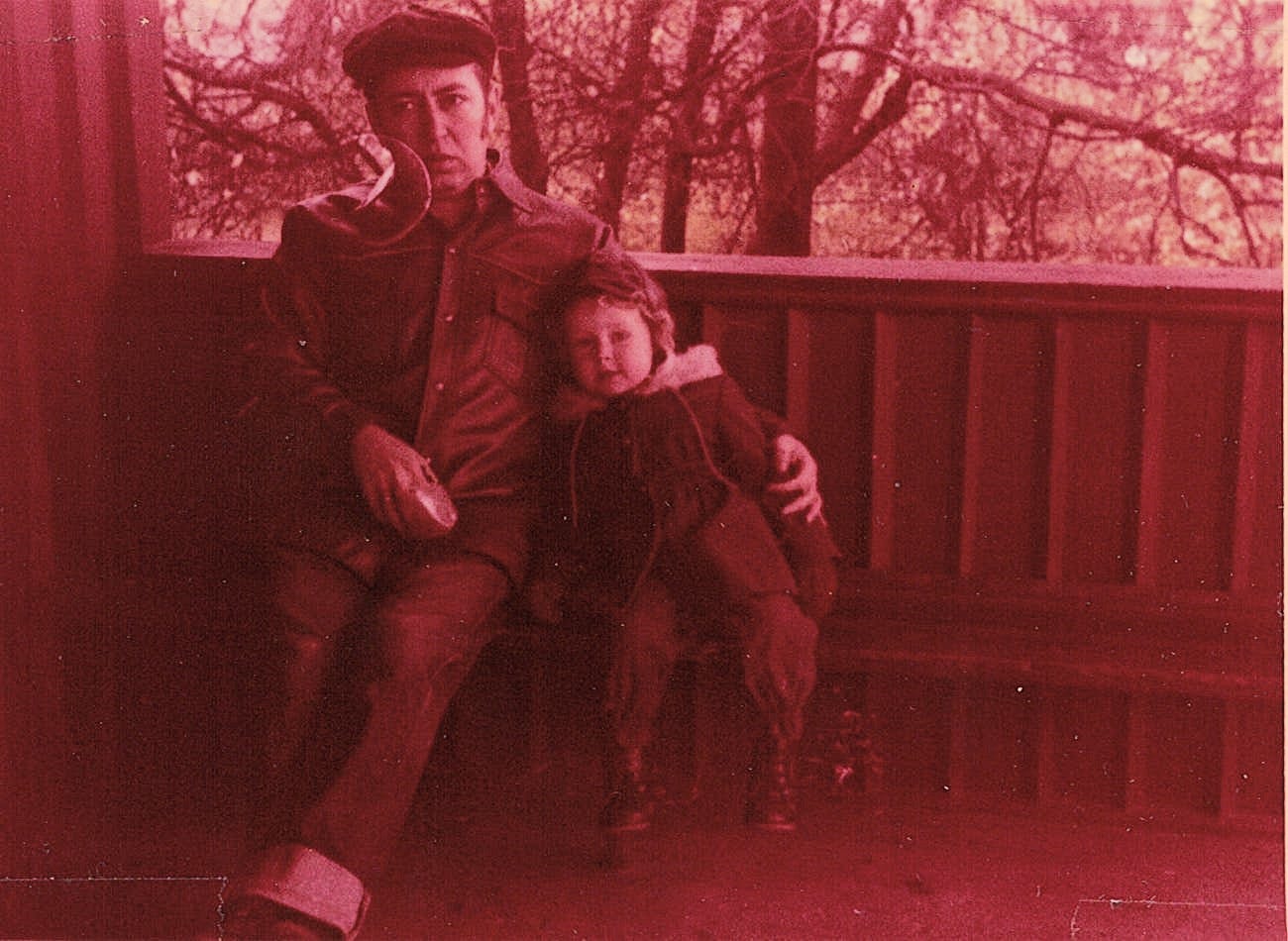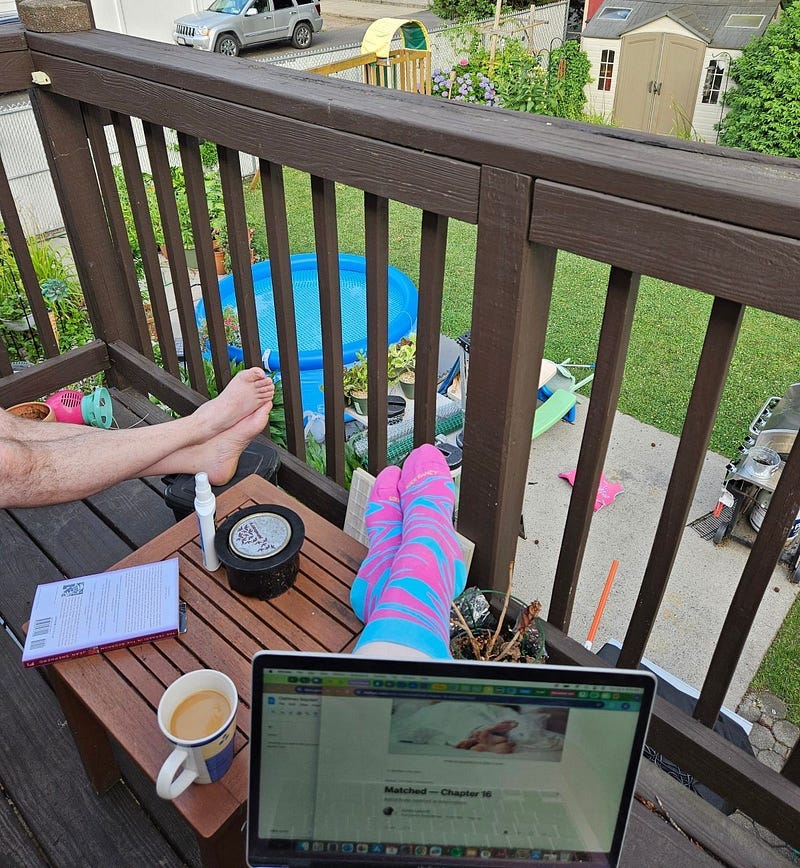Between the Lines: An Interview with Jordan Lubov
When Diana asked the KTHT community which writers they wanted to know more about, Jordan’s name was high on the list.
For this second KTHT writer interview, I’ll be exploring the versatile Jordan Lubov’s work and what inspires it. My questions will be formatted as quotes.
Introduction
Jordan is a writer who fearlessly pushes boundaries, whether in memoir or fiction.
We first crossed paths in 2023, when I edited a fiction serial from Jordan for Redemption Magazine. I was struck by how effortlessly she draws in the reader and creates characters who feel both real and transgressive.
Jordan understands the power of vulnerability where her memoirs are concerned — and writes with fearless honesty
When Diana asked the KTHT community which writers they wanted to know more about, Jordan’s name was high on the list. So I delved into her world.
Sit back and enjoy getting to know this intrepid author.
The Childhood Move
You’ve written that you were “an entirely different person” before the family moved to the U.S. when you were ten. Could you tell me more about who that girl was, and where she was living before everything changed?
Jordan: Losing language has a way of shutting you up and bringing out all the insecurities. That’s what had happened to me. Growing up in Estonia, my family spoke Russian at home, but I also had some functional knowledge of Estonian — enough to get by in simple situations and get groceries. Neither of those helped me when we moved to New York.
As a kid in Tallinn, I was outgoing and loquacious. I made friends easily, starting up conversations with kids on the street or on the playground. I loved to perform too, to sing and recite poetry. But not knowing English cut off my ability to express myself. It also devastated my confidence. I developed an anxiety over speaking to anyone, afraid to get it wrong, to be misunderstood. It was life-changing.
Now I can see why moving left you feeling alone and like an outsider.
Do you think those strong emotions drew you toward writing? And does distress still drive your work, or has that relationship evolved over time?
Jordan: In a most literal way — yes. It was 1992 and the cheapest mode of international communication at the time was letter writing. Feeling lonely and missing my friends, I spent a lot of time writing letters. I wrote long, rambling letters about anything and everything, describing clothes and other kids in school. Then, just before ringing in the New Year, 1993, my dad suggested that I write a letter to myself, one that I wouldn’t open until the following year. He tried to show me as depressed as I was feeling at the time, that it wouldn’t be permanent. That in a year, I would look back at this time and be in a totally different place. Aclamated. He wasn’t wrong. I wrote more about this in an article once.
Both in my childhood and now writing has been a calming, introspective exercise. It’s been an escape. Back then, I wrote to pour out my angst. Now, I write to get my mind off unpleasantness, things that bother me, immersing myself in things I’d rather think about instead.
Emotional Range
That makes sense and your writing does span a wide emotional range, across both fiction and nonfiction. Indeed you move easily between erotic, romantic and the dark. How do you decide which stories or experiences are worth sharing?
Jordan: It’s just a matter of what I feel in the mood for at any particular time. I always have a dozen tabs with Google Docs open, and I work on stories depending on what strikes me that day. Some days are darker, I feel a pull toward something nefarious and heavy. Other days, light, romantic exchanges are circling my brain, and I need to get them down.
I find that this works best for me — to be working on several things at once and to switch according to mood. The stories never turn out as well when I force them, when I decide that I have to finish something that doesn’t flow. This also means that I have a lot of unfinished stories that I just haven’t felt the draw to return to and complete.
But there are days when something sparks my motivation to write, like your prompt in Tantalizing Tales for a truth-to-fiction story, and the entire piece pours out of my fingers in one shot. I just have to catch them on days like that.
Partnership
You’ve written candidly about the evolution of your relationship with Peter — from friends to lovers to partners and parents. How has your marriage shaped your writing life, your voice, or your sense of self?
Jordan: Marriage and parenthood certainly pivoted the direction my writing has taken and the sort of therapy it provides for me. Before Peter and I got married, we used to write a food blog together for a bit. Some of it was about the interesting new restaurants we’d gone to, some of it was about cooking at home; we’d even had our own little hot dog tour, comparing different regional hot dogs in different states. It was something we did together for fun.
After having our first daughter, though, I sank into a deep postpartum depression and started writing a memoir about my college years, about the girl I was then and the fun that I remembered having with friends. It became more of an escape from real life as opposed to a depiction of it, like the blog had been.
With medication and with time, I worked through that part of my life, but writing has remained an escape still. I realised, at some point, that I’ve always had these stories in my head, that I always distracted myself with characters, and that letting them out provided some relief. Writing is me time. It’s one of the few things I get to do on my own in this life, where people constantly surround me. Aside from occasional post-work time alone in my classroom, I am never alone. I commute with my younger daughter, I’m surrounded by kids at home and at work, I’m lucky enough to have a husband who is always there, but I don’t have any time when it’s just me!
Certainly, it has also given me more subject matter to write about. Aside from the non-fiction pieces I have written about my relationship with Peter, and the satirical stories I’ve written for the publication Frazzled about my kids. I’ve also written erotica based on my married life. Those are Peter’s favorites, for sure. He takes a certain amount of pride in being an inspiration for something sexy. This is one that most closely depicts our real life.
Dad / Dementia
I love that photo of you and your dad…
You mention your father wrote poetry — how did that influence you at the start of your own writing journey?
Jordan: To be honest, I hadn’t made the connection for many years at all. It had been quite some time since my dad shared any of his poetry with anyone and it wasn’t until after he was gone and mom found some of his notebooks that I even remembered.
My dad had never considered himself a writer and when I had some aspirations, at a younger age, to pursue writing as a career, he actively discouraged me, telling me that I needed something more solid and reliable to make money from and to continue writing as a hobby. When I wanted to apply to colleges as a creative writing major, he didn’t allow me to, saying that I could always write on the side no matter what I chose to do as a career and, at one point, seriously steered me towards library science.
That said, he never suggested that I should stop writing, just that it had to be secondary to something else. He had proudly saved some of my writing from the earlier years and had even sent some of my stories to his cousin, who worked in publishing, though nothing ever came of that.
In a way it seems like he wanted the best for you. I know you’ve written a very personal trilogy about your dad and his often terrifying dementia journey. Were there moments during his illness when you still glimpsed the man he used to be?
Jordan: They were rare, but the one that I particularly remember as a bit of lightness in a terrible time was when he was already in the hospital. He rarely spoke at this point, and it was even more rare for him to open his eyes.
I visited him with my mom that morning, and we talked, sitting on either side of his bed. It was impossible to say whether Dad was awake or not. Mom was telling me that she had just finished reading one of my romance books and that it was ok, but that she found all the explicit sex unnecessary. I explained to her that this was the genre and that I’m not alone in writing this, nor will my readers be shocked by it. We had a bit of a back-and-forth about it, a pseudo-argument.
And suddenly, my dad spoke up, surprising us both. Without opening his eyes, he raised his hands and said, “Don’t fight.” He was frequently the peacemaker between my mom and me. That was certainly a reminder of who he’d always been.
He must have been really listening to your conversation.
Have you been able to hold on to happy memories from before his illness?
Jordan: Absolutely. I prefer to remember him from years before and not the way he was at the end. In the aftermath, Mom and I had many conversations about how far back this had started and what the signs were early on that we had missed. I see it in pictures, too, when he still looked like himself. He was a warm and kind person, but also incredibly stubborn. He had a gentle way about him and a calm voice, and when he got mad, he gave you the silent treatment as opposed to yelling.
The Role of Writing
You’re a teacher, a parent, a partner — but you’ve also kept this long relationship with writing going, even when no one was ‘watching’. What does writing give you that nothing else can?
Jordan: An escape. It’s the only thing that can wholly consume my overactive anxiety and ADHD brain. I can bury myself in the fictional story I’m writing, in the lives of the characters in whose head I’m dwelling, and block out the world for a little bit. There was a stretch of time when thinking about the storylines was the only thing that would calm my racing thoughts enough to fall asleep. It’s almost like meditation for me, something to calm down and catch my breath.
Writing more personal pieces, narratives from my own experience, and snippets of life has been therapeutic, too. As someone who constantly replays situations and conversations in her mind, it can be a relief to get them down on “paper” and out of my head. It serves as a way to say them out loud, to get them in the open, and often, to receive an affirmation that I’m not alone in these experiences.
My Self-Torture
I torture myself with reels of organization, cleaning, and meal prep as I sit on my sofa or lay in my bed and I long for the magic to happen at my house. M…
What do you hope readers take away from your work, particularly regarding your personal experiences and themes of mental health?
Jordan: I think with all my stories, fiction and non-fiction, I strive to be relatable. I hope that readers will be able to identify with what I’ve been through and with what my fictional characters have encountered and see something similar in themselves.
I think you have succeeded. Your work is very relatable.
You expressed a desire for a dedicated writing space. What does an ideal writing environment look like for you?
Jordan: I think what’s ideal is evolving with age, hehe. I’ve always written in the living room, sitting with my laptop in my lap while life went on around me. I was able to completely shut out the rest of the world when I was in the zone. It was a point of annoyance for my husband that I’d get so engrossed that I wouldn’t hear when someone was talking to me. I never used the dining room or the kitchen table; I didn’t need any sort of accommodations.
But now, I find myself more comfortable and productive writing at my desk in my empty classroom after hours. I have a comfortable office chair, I can put my feet up on a step stool under my desk, and I have a space on the desk for a physical mouse, as opposed to a touch pad. I like having a space beside me on the desk to doodle in between surges of ideas, too.
I’d like an area where I can leave my stuff out instead of having to clear things away every time. I have a rolling shelf organizer with my binders and notebooks, and pens. I put my laptop away on a side table where I plug it in for the night. It’s a pain not being able to spread out and have things at hand. I’d love to be able to stick Post-its up in front of me and look out at the thoughts I’d jotted down. Having everything in notebooks and binders, I actually forget, sometimes, about projects that I’ve started!
More and more, I feel distracted on the couch at home. If the TV is on, if the kids are talking, if the dishwasher is running. Everything feels too loud for me in a way that it didn’t used to when I was younger.
I understand that. I do like quiet when working too.
Have you tried traditional publishing, self-publishing, or both? What have you learned from the process?
Jordan: I made a couple of half-hearted attempts at traditional publishing, but it has been a while since I’ve tried. Years ago, I attempted to query some publishers who accepted unsolicited manuscripts, but had no luck with it. I had only sent a handful of submissions, but heard back from none.
At what seemed like the height of the Twitter pitch popularity, I participated in a few of the events and had some limited luck with them. I received three full requests, and one of them resulted in a rewrite and resubmit request. It was really exciting, and I worked for several months on my rewrite. But after resubmitting, I never heard back from that publication again.
I started self-publishing nearly four years ago, and I can’t say that I’ve been successful with it. I try to listen to reasonable advice and attempt new things as far as how I approach it, but none of my books are exactly flying off the shelves.
I think I’ve achieved more success with my short stories, to be honest. Certainly, they bring in way more reader feedback than the books do. And a bit more in royalties as well. The limited following that I may have, from loyal readers, is due to the short stories I publish on Medium and Substack rather than from the books I have on Amazon.
Are there specific writers or books that shaped your style or you have gained inspiration from?
Jordan: This is a more difficult question to answer. I read a lot of indie authors these days, and I frequently note things that I enjoy about their books and their style in order to enhance my own.
I’ve always enjoyed the works of Nick Hornby, though, and more recently have thought about how much his storylines align with the romance tropes and beats. He may be associated more with Literary Fiction, but many of his works and some of my favorite books of all time are the sort of romance I aspire to! They are about realistic and relatable people in a mess who make mistakes and figure out ways to solve them. Dialogue flows and feels natural, but the characters are also quirky enough to be interesting. I strive for that.
Advice
I agree with you about Nick Hornby and love to keep things real.
What advice would you give to writers who are also balancing family and other responsibilities?
Jordan: Make sure to talk to your partner about what writing means to you, how important it is, the sort of relief or escape that it offers. There can be a lot of resentment involved if you don’t. I know that from personal experience. Talk early, talk often.
Thanks, Jordan, for being so generous, both in conversation and in your work.
Talking to Jordan was a real pleasure. She shared so openly and with such ease — just like her writing, where I’m often drawn in before I’ve realised. We covered everything from her early years, to her family, to what keeps her coming back to the page.
Thanks, Jordan, for being so generous, both in conversation and in your work.
Check out KTHT first interview here:










Jordan saying about losing her language as a kid and how it made her "shut up" and devastated her confidence gave me goosebumps. I've had the exact same experience. The questions were so thoughtful! The natural, respectful back-and-forth made it such a delightful interview. Great job💜
Loved this interview, and getting to know you better, Jordan! So much of what you shared here resonated with me, such as writing on the couch, your mind being quiet when you write, and needing a dedicated space for writing. I am no longer writing on the couch, but at the dining room table and this has worked wonders for me to have more space, but also to be fully present when I'm on the couch, spending time with my husband.